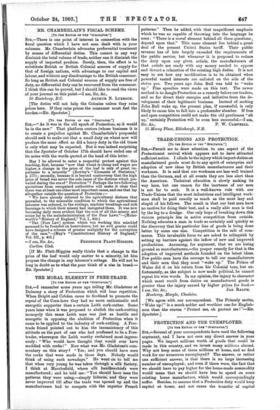THE MORAL ELEMENT IN FREE-TRADE.
[To THE EDITOR OF THE "SPECTATOR."] Slit,—I remember some years ago telling Mr. Gladstone at Dalmeny a story of Protection which will bear repetition. When Bright and Cobden came to Scotland to promote the repeal of the Corn-laws they had no more enthusiastic and energetic supporter than a certain Leith cork-cutter. Some years later when it was proposed to abolish the cork-cutting monopoly this same Leith man was just as hostile and energetic in opposing the abolition of Protection when it came to be applied to the industry of cork-cutting. A. Free- trade friend pointed out to him the inconsistency of this attitude on the part of one who had professed to be a Free- trader, whereupon the Leith worthy exclaimed most ingenu- ously: "Who would have thought they would ever have meddled with corks !" Now what was Mr. Gladstone's com- mentary on this story? " Yes ; and you should have seen the corks that were made in those days. Nobody would think of using such nowadays." He went on to tell me that when very young he was taken through a silk factory, I think at Macclesfield, where silk handkerchiefs were manufactured ; and he told me : "You should have seen the patterns thejr were using,—simply hideous, an& they were never improved till after the trade was opened up and the manufacturers had to compete with the superior French patterns!' Then he added, with that magnificent emphasis which he was so capable of throwing into the language he used : "There is a moral element behind all these questions ; depend upon that." This same element lies behind a great deal of the present United States tariff. Their public revenue has of late largely exceeded the requirethents of the public service, but whenever it is proposed to reduce the duty upon any given article, the manufacturers of that article are ready with any money needed to oppose and thwart a relaxation of the existing high duties. It is not easy to see bow any modification is to be obtained when powerful vested interests are enlisted on the side of the status quo. Two years ago John Bull was told to "wake up." Fine speeches were made on this text. The newer method is to dangle Protection as a remedy before our traders, and so far divert their energies and initiative from the de- velopment of their legitimate business. Instead of making John Bull wake up, the present plan, if successful, is only likely to cause him to fall into a profounder slumber. If free and open competition could not make the old gentleman "sit up," certainly Protection will be even less successful.—I am, Sir, &c., P. W. CAMPBELL. 25 Moray Place, Edinburgh, N.B.






















































 Previous page
Previous page